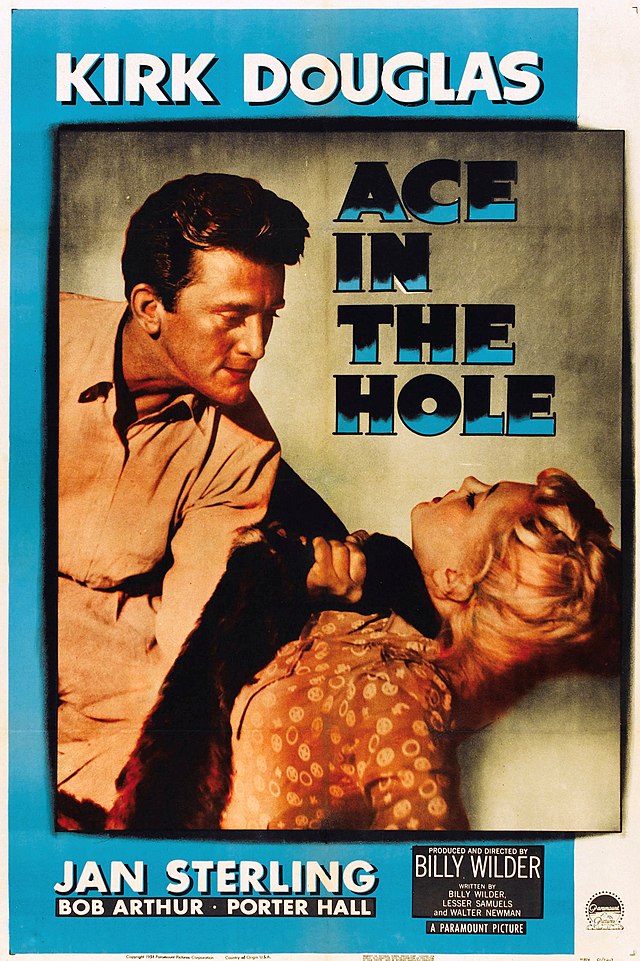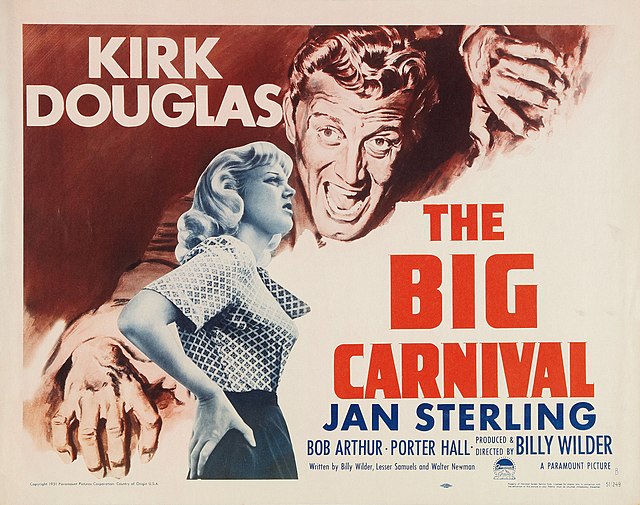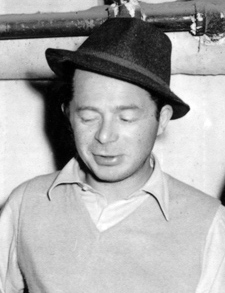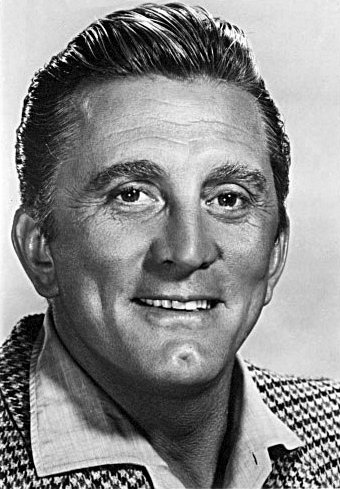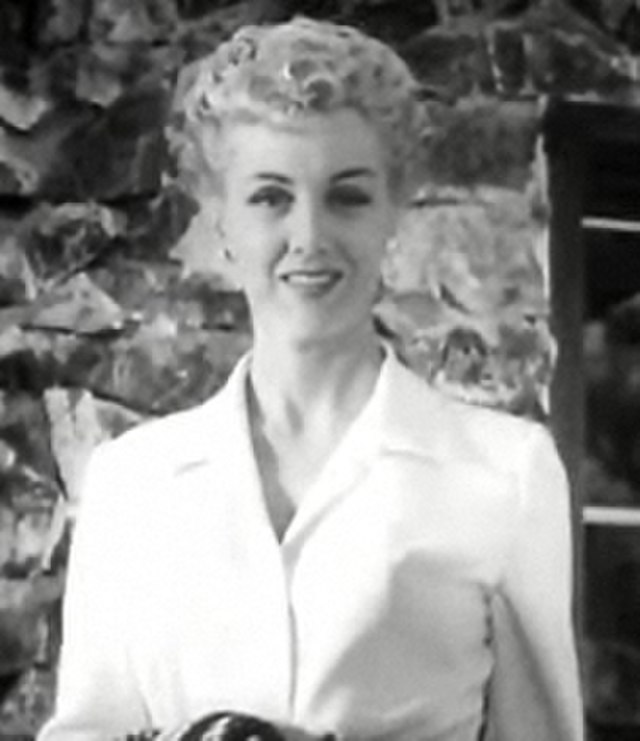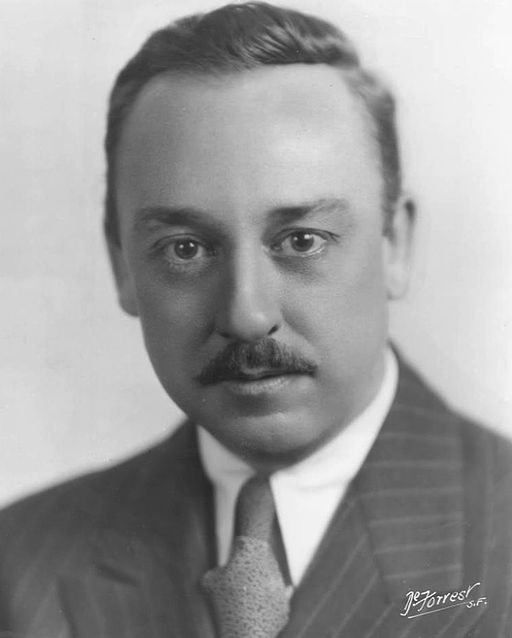Ace in the Hole – 1951
Summary
Billy Wilder's Ace in the Hole is a scathing critique of sensationalist journalism and the darker aspects of human nature. The film tells the story of Charles Tatum (Kirk Douglas), a disgraced New York reporter who finds himself stuck in Albuquerque, New Mexico, working for a small-town newspaper. Ambitious and cynical, Tatum longs for a big story to rejuvenate his career and get him back to the limelight of metropolitan journalism.
Tatum's opportunity arises when he stumbles upon a local man, Leo Minosa (Richard Benedict), trapped in a collapsed cave while hunting for Native American artifacts. Sensing the makings of a media spectacle, Tatum manipulates the situation, ensuring that the rescue operation is prolonged. He convinces local officials to use an unnecessarily slow drilling method under the pretense of safety, turning the site into a carnival-like attraction.
The rescue effort quickly becomes a national sensation. Reporters swarm the scene, and tourists arrive in droves, transforming the tragedy into a grotesque spectacle. Tatum leverages his exclusive access to the story, making himself indispensable to the media frenzy. He also manipulates Leo's wife, Lorraine (Jan Sterling), who is indifferent to her husband's plight and sees the situation as an opportunity to profit from the sudden influx of attention and money.
As days pass, Leo's condition deteriorates. Despite his growing guilt, Tatum continues to exploit the situation until it spirals out of his control. When the rescue attempt finally reaches Leo, it's too late—he has succumbed to his injuries. Devastated by his role in the man's death and the moral cost of his ambition, Tatum confronts his own downfall. In the film's final scene, Tatum collapses in the newsroom, defeated by his own hubris and the corruption he perpetuated.
________________________________________
Analysis of Ace in the Hole
Themes
Ace in the Hole is a biting commentary on media sensationalism and the lengths to which individuals will go for personal gain. The film exposes the moral compromises made by journalists, the gullibility of the public, and the corruptibility of human nature in the face of greed and ambition.
• Media Manipulation: Tatum's actions highlight the media's ability to shape and distort reality for profit. His deliberate prolonging of the rescue effort is a chilling example of how tragedy can be commodified.
• Moral Decay: Tatum embodies the ruthless ambition that sacrifices ethics for success. His descent mirrors the broader societal tendency to prioritize spectacle over substance.
• Exploitation and Dehumanization: The transformation of the rescue site into a carnival underscores the public's complicity in reducing human suffering to entertainment.
Characters
• Charles Tatum: Kirk Douglas delivers a magnetic performance as Tatum, a character driven by ambition and self-interest. His charisma and determination are tempered by a deep-seated cynicism, making him both compelling and repugnant.
• Lorraine Minosa: Jan Sterling's portrayal of Lorraine adds complexity to the story. Her apathy toward her husband and opportunism reflect a different facet of human selfishness.
• Leo Minosa: Leo serves as a tragic figure, an ordinary man whose suffering becomes a pawn in a larger game of exploitation.
Cinematography and Direction
Charles Lang’s cinematography vividly captures the desolate New Mexico landscape, juxtaposing the emptiness of the environment with the chaos of the rescue site. Billy Wilder’s direction is unflinching, refusing to offer redemption for its flawed characters. The film's stark visuals and unsentimental narrative contribute to its noir aesthetic, emphasizing the bleakness of its themes.
Legacy
Upon its release, Ace in the Hole was a commercial failure and received mixed critical reception. Many considered its unrelenting cynicism too harsh for audiences of the time. However, it has since been re-evaluated as a masterpiece, lauded for its prescient critique of media sensationalism. The film’s themes remain relevant in an age of 24/7 news cycles and viral tragedies, cementing its status as a cautionary tale about the dangers of unchecked ambition and the ethical lapses of modern journalism.
Ace in the Hole Trailer
Full Cast
• Kirk Douglas as Charles "Chuck" Tatum
• Jan Sterling as Lorraine Minosa
• Robert Arthur as Herbie Cook
• Porter Hall as Jacob Q. Boot
• Richard Benedict as Leo Minosa
• Ray Teal as Sheriff Gus Kretzer
• Frank Cady as Mr. Federber
• Gene Evans as McCardle
• John Berkes as Papa Minosa
• Frances Dominguez as Mama Minosa
• Lewis Martin as Paul Kretzer
• Frank Jaquet as Sam Smollett
• Geraldine Hall as Nellie Federber
• Harry Harvey as Dr. Hilton
Stellar Performance of Kirk Douglas
Kirk Douglas delivers a towering, unforgettable performance as Charles "Chuck" Tatum in Ace in the Hole. His portrayal is a masterclass in embodying moral complexity and unrestrained ambition, capturing the essence of a man willing to exploit anyone and anything to claw his way back to the top. Douglas's commanding screen presence and dynamic range make Tatum one of the most compelling antiheroes in cinema history.
Charisma and Ruthlessness
Douglas infuses Tatum with a magnetic charisma that draws viewers into his orbit, even as his actions provoke moral revulsion. From the moment he enters the small-town newsroom, Douglas exudes a brash confidence, establishing Tatum as a man who thrives on manipulating others. His sharp, biting dialogue is delivered with a mix of sardonic humor and unrelenting determination, making it impossible to look away from his performance.
Yet beneath Tatum’s surface charm lies a ruthless opportunist, and Douglas expertly navigates this duality. He plays Tatum as a man driven by desperation, using his charm as a weapon to achieve his selfish goals. This combination of charisma and ruthlessness makes Tatum both captivating and deeply unsettling.
Emotional Depth
Douglas’s performance goes beyond surface-level bravado, revealing the vulnerability and inner turmoil that drive Tatum’s actions. In quieter moments, such as when he reflects on his fall from grace or grapples with the consequences of his schemes, Douglas allows flashes of insecurity and regret to break through. These moments of introspection add depth to the character, preventing him from becoming a one-dimensional villain.
One of the most poignant aspects of Douglas’s performance is his portrayal of Tatum’s unraveling. As the situation spirals out of his control and Leo Minosa’s condition worsens, Douglas shifts from calculated confidence to panicked desperation. His facial expressions, body language, and delivery all reflect a man increasingly haunted by his own decisions. The transformation is both believable and devastating, underscoring the tragic cost of Tatum’s ambition.
Physicality
Douglas’s physicality is a crucial element of his performance. He uses his imposing presence to dominate scenes, whether he’s barking orders at subordinates or charming his way into exclusive access to the story. His energy is relentless, mirroring Tatum’s insatiable drive. Even in moments of stillness, Douglas’s intensity is palpable, as if Tatum is always calculating his next move.
Mastery of Dialogue
Wilder’s sharp, incisive dialogue comes alive in Douglas’s hands. He delivers lines with razor-sharp precision, using his voice as an instrument to convey Tatum’s cunning, wit, and disdain. Whether he’s manipulating Lorraine Minosa, outsmarting rival reporters, or lecturing on the art of a good story, Douglas’s delivery is pitch-perfect, brimming with confidence and underlying menace.
Legacy of the Performance
Kirk Douglas’s performance as Charles Tatum is a cornerstone of Ace in the Hole’s enduring power. He creates a character who is both larger than life and painfully human, embodying the film’s themes of ambition, exploitation, and moral corruption. His ability to balance Tatum’s charm with his darker impulses ensures that the character remains unforgettable long after the credits roll.
This role is often considered one of Douglas’s finest, showcasing his range, intensity, and willingness to tackle morally complex characters. It’s a performance that anchors the film’s critique of sensationalism and human greed, elevating Ace in the Hole into a cinematic classic.
Notable Film Lines
Charles Tatum (Kirk Douglas):
• "Bad news sells best. Good news is no news."
This line epitomizes Tatum’s cynical worldview and the central theme of media exploitation.
• "I can handle big news and little news. And if there's no news, I'll go out and bite a dog."
A wry, sarcastic comment that underscores Tatum’s determination to create a story where none exists.
• "I don't go to church. Kneeling bags my nylons."
A glimpse into Tatum’s irreverent and self-serving nature, showing his disdain for conventional morality.
• "It's a great story. Practically makes itself. And all I have to do is hand out the adjectives."
Reflects his manipulative approach to journalism, where embellishment trumps truth.
• "You like those rocks just as much as Leo does. You want them to be under your feet so you can walk out on me."
Tatum confronts Lorraine Minosa, exposing both their selfishness and his growing desperation.
________________________________________
Lorraine Minosa (Jan Sterling):
• "I met a lot of hard-boiled eggs in my time, but you’re twenty minutes."
Lorraine delivers this scathing insult to Tatum, highlighting her sharp wit and cynicism.
• "I don’t go to church. Kneeling bags my nylons."
A sardonic line from Lorraine that mirrors Tatum’s irreverence and lack of morality.
________________________________________
Sheriff Gus Kretzer (Ray Teal):
• "We’re all in the same boat."
A line that reflects the collusion between law enforcement, media, and other parties in prolonging the spectacle for personal gain.
________________________________________
Charles Tatum's Commentary on Journalism:
• "Tell the truth? I can tell it better!"
A chilling line that encapsulates Tatum’s belief in manipulating facts to create a more compelling narrative.
• "You’ve got a good thing going here. A thousand people a day, paying fifty cents a head to watch someone die. It’s the best show in town!"
A damning critique of the public’s morbid fascination with tragedy and the media’s role in monetizing it.
Classic Scenes from Ace in the Hole (1951)
Billy Wilder’s Ace in the Hole is filled with memorable scenes that exemplify its dark themes, biting critique of society, and striking visual storytelling. Here are some of the most iconic and impactful moments from the film:
________________________________________
The Opening Scene: Tatum's Arrival in Albuquerque
• Description: The film opens with Charles Tatum (Kirk Douglas) driving into Albuquerque, his car broken down and his career in shambles. He marches into the small-town newspaper office with confidence, demanding a job despite his tarnished reputation. His pitch is peppered with sharp one-liners, including, “I'm a $250-a-week newspaperman. I can be had for $50.”
• Significance: This scene establishes Tatum’s brash personality, his fall from grace, and his hunger for a way back to the top. It sets the tone for his relentless ambition and moral flexibility.
________________________________________
The Discovery of Leo Minosa
• Description: Tatum stumbles upon the scene of Leo Minosa (Richard Benedict) trapped in a collapsed cave while searching for artifacts. Realizing the potential for a sensational story, he immediately begins orchestrating the situation to his advantage, persuading officials to delay the rescue for maximum media exposure.
• Significance: This scene introduces the central conflict and reveals Tatum’s manipulative nature. The moment he decides to turn Leo’s plight into a spectacle is the turning point for his character and the film’s plot.
________________________________________
The Media Circus
• Description: As the rescue operation turns into a nationwide sensation, the site transforms into a grotesque carnival. Vendors sell food, tourists take photos, and amusement rides are set up, all while Leo Minosa lies trapped underground. Tatum basks in the chaos, enjoying his newfound fame and control over the story.
• Significance: This scene is a powerful critique of the public’s morbid fascination with tragedy and the commercialization of human suffering. The carnival atmosphere contrasts starkly with Leo’s dire predicament, highlighting the dehumanization at the heart of the spectacle.
________________________________________
Lorraine’s Cynicism
• Description: In a tense exchange between Tatum and Lorraine Minosa (Jan Sterling), she bluntly reveals her indifference toward her husband and her eagerness to profit from the situation. Tatum scolds her for her apathy, but his own motives are equally self-serving.
• Significance: This scene exposes the selfishness and moral decay of both characters. Lorraine’s sharp dialogue, including “I’ve met a lot of hard-boiled eggs in my time, but you’re twenty minutes,” solidifies her as one of the film’s most cynical figures.
________________________________________
Tatum’s Breakdown
• Description: After days of manipulating the situation, Tatum realizes the gravity of his actions when Leo succumbs to his injuries. Tatum’s guilt consumes him, and he attempts to confess to his role in prolonging Leo’s suffering, but it’s too late to undo the damage.
• Significance: This climactic moment shows Tatum’s unraveling and confronts the audience with the devastating consequences of unchecked ambition and moral compromise. Kirk Douglas delivers a raw and haunting performance that cements this scene as a standout.
________________________________________
The Final Scene: Tatum’s Fall
• Description: In the film’s chilling conclusion, Tatum collapses in the newsroom after failing to redeem himself. His dramatic fall symbolizes the ultimate price of his hubris and the corruption that consumed him.
• Significance: Wilder ends the film on a bleak note, refusing to offer redemption for Tatum or the audience. The final shot is a stark reminder of the destructive power of greed and ambition.
Awards and Recognition
• Academy Awards (1952):
• Nomination: Best Writing, Story and Screenplay – Billy Wilder, Lesser Samuels, and Walter Newman.
• National Board of Review (1951):
• Winner: Best Actress – Jan Sterling.
• Venice Film Festival (1951):
• Winner: International Award for Best Director – Billy Wilder.
• Winner: International Award for Best Score – Hugo Friedhofer.
• Nomination: Golden Lion for Best Picture.
• National Film Preservation Board (2017):
• Selection: National Film Registry – Recognized for being "culturally, historically, or aesthetically significant."

